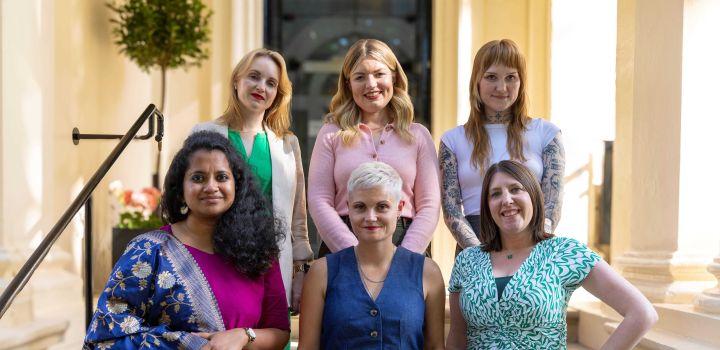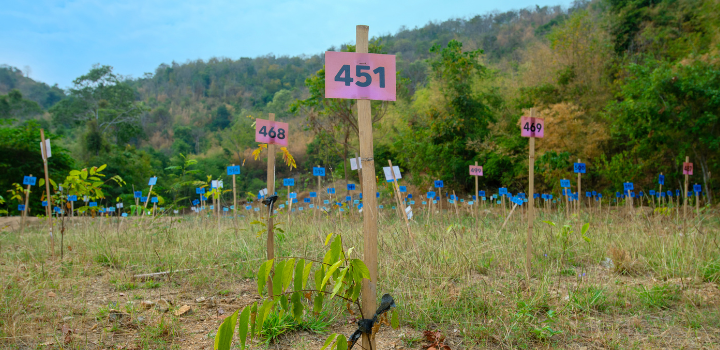UEA researcher named BBC New Generation Thinker for groundbreaking work on climate and child marriage
By: Communications

The University of East Anglia’s Dr Reetika Revathy Subramanian has been named one of the BBC’s 2025 New Generation Thinkers.
The prestigious scheme, a collaboration between UKRI’s Arts and Humanities Research Council (AHRC) and BBC Radio 4, seeks out rising academic voices who are passionate about bringing their research to wider audiences.
The honour is awarded to just six early-career researchers each year, with a nationwide search identifying outstanding academics and helping them bring their research ideas to a broader audience on BBC radio.
Selected from hundreds of applicants, these six researchers represent some of the brightest emerging minds in their fields. As part of the programme, Dr Subramanian will collaborate with four Radio 4 teams across the UK, who work on programmes such as Free Thinking and Thinking Allowed, weekly science programmes, Front Row and Woman’s Hour.
Dr Subramanian, a Senior Research Associate at UEA's School of Global Development, has been recognised for her innovative work at the intersection of gender, climate, and migration.
She is the creator of Climate Brides, a multimedia project and podcast investigating how climate change is deepening the drivers of child marriage in South Asia.
Why people move, who stays behind, and how marriage, labour, and climate change shape these choices are central questions explored by Dr Subramanian.
With a background in journalism in India and a PhD in Multidisciplinary Gender Studies from the University of Cambridge, Dr Subramanian works at the intersection of academic research and creative storytelling - drawing on podcasts, comics, and women's work songs to surface grounded, everyday narratives.
The 2025 group of New Generation Thinkers have a wide range of research interests, including: the role which language plays in healthcare; Second World War espionage; evolving perceptions of crime and justice from Medieval times until the present day; how marriage, labour and climate impact migration; and women's contributions to television and film.

Caption: Front row (left to right): Dr Reetika Subramanian, University of East Anglia; Ashleigh Percival-Borley, Durham University; Dr Stephanie Brown, University of Hull.
Back row (left to right): Dr Beth Malory, UCL; Dr Sarah Louise Smyth, University of Essex; Dr Laura Minor, University of Salford. Credit: BBC.
Matthew Dodd, Commissioning Editor, Arts, BBC Radio 4, said: "As the biggest speech radio station in the UK, Radio 4 is thrilled to introduce six brilliant early-career academics to such a broad audience. Their commitment to reaching the wider public with their research will enrich Radio 4’s programming, delivering new perspectives that inspire and challenge.”
Professor Christopher Smith, AHRC Executive Chair, said: “New Generation Thinkers communicate fascinating ideas to the public, expanding our cultural, social and philosophical horizons while prompting important conversations.
“With subjects as diverse as climate change, war and healthcare, and methodologies as varied as film making and storytelling, these early careers researchers will explore important ideas that have shaped, and continue to shape, our world.
“I look forward to see what these six brilliant, original thinkers can produce with the resources of the BBC at their fingertips.”
If you are looking to start university in September 2025 and are still thinking about your options, consider joining a UK Top 25 university this September through Clearing.
Related Articles

Social justice should not be tokenistic but at the heart of global restoration efforts
Social justice must be at the heart of global restoration initiatives - and not “superficial” or “tokenistic” - if ecosystem degradation is to be addressed effectively, according to new research by the University of East Anglia (UEA).
Read more
2025 – a year in research
The past twelve months have seen UEA researchers break new ground on everything from Magna Carta to the mating habits of jaguars in the Amazon. Join us as we take a look back at just some of 2025’s incredible stories, discoveries and expert insights.
Read more
UEA’s grant and funding success – October 2025
Discover the latest research and funding grant successes happening within the University of East Anglia.
Read more